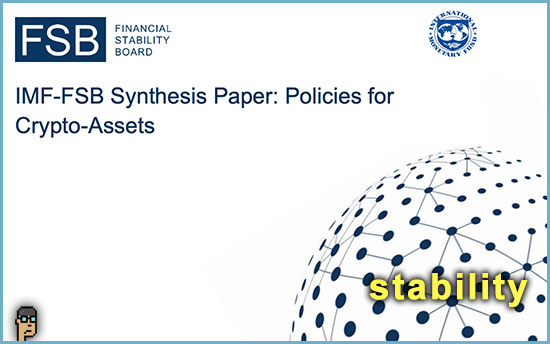global stability recommendations
The International Monetary Fund (IMF) and the Financial Stability Board (FSB) came out with new recommendations for financial system participants, i.e. banks, on how they should interact with crypto-asset products “including those associated with stablecoins and those conducted through so-called decentralised finance (DeFi).” See the press release.
As part of the policy paper announcement, which was made in advance of the G20 meeting this weekend in India, the international bodies suggest a policy implementation roadmap (see it) for members of the G20 as well as those outside its jurisdiction.
According to CoinDesk, the report “reiterated the IMF’s stance that crypto blanket bans may not help in mitigating associated risks and added that targeted restrictions might come in handy for emerging economies in particular.” Read CoinDesk’s summary.
It’s important to note that the IMF and FSB’s recommend against blanket bans of crypto. In other words, you gotta deal with crypto, it’s not going away. Specifically, the report reads, “Blanket bans that make all crypto-asset activities (e.g., trading and mining) illegal can be costly and technically demanding to enforce. They also tend to increase the incentives for circumvention due to the inherent borderless nature of crypto- assets…”
Download: IMF-FSB Synthesis Paper: Policies for Crypto-Assets (PDF)
CFTC “attacks” DeFi
Blockchain Association Chief Policy Officer Jake Chervinsky was blunt on X last night: “Perhaps we should lay to rest the idea that the CFTC is ‘a better regulator’ for crypto than the SEC.”
His reaction was to yesterday’s announcement by the CFTC that it had settled enforcement actions in the digital asset decentralized finance (DeFi) space against Opyn, ZeroEx, andDeridex, Inc.
According to the CFTC release: “Deridex and Opyn are charged with failing to register as a swap execution facility (SEF) or designated contract market (DCM), failing to register as a futures commission merchant (FCM), and failing to adopt a customer identification program as part of a Bank Secrecy Act compliance program, as required of FCMs. ZeroEx, Opyn and Deridex are also charged with illegally offering leveraged and margined retail commodity transactions in digital assets. ” Read more.
CFTC Commissioner Summer Mersinger issued a dissent to the Commission’s actions saying rhetorically, “If a DeFi protocol is developed for lawful purposes but is used for purposes that violate the CEA, should the developer be held liable?”
On X, DeFi Education Fund’s Miller Whitehouse-Levine noted the parallels to a court decision by Judge Katherine Polk Failla in the recent Uniswap decision where Failla wrote, “…it defies logic that a drafter of computer code underlying a particular software platform could be liable under Section 29(b) for a third-party’s misuse of that platform.” (Failla is also presiding over Coinbase v. SEC)
Blockchain Association’s Chervinsky concluded on X, “Today, the CFTC violated the court’s opinion in the Uniswap class action – and its own principles – in an attack on DeFi.”
Commissioner piloting policy
In a speech at the Cato Institute’s crypto event yesterday, CFTC Commissioner Caroline Pham delivered a keynote speech that proposed a “first-ever U.S. pilot program for digital asset markets.” The program is an outgrowth of her own belief that the CFTC needs to use its “existing authority” to make sure guardrails are in place that to “provide regulatory clarity for digital assets.”
She said, “It is my hope that a pilot to test, gather data, and develop a pragmatic approach to digital assets and tokenization can ensure we continue to uphold our mandate of fostering open, transparent, competitive, and financially sound markets.” Read her speech.
Blockworks noted Pham’s emphasis on collaboration: “Pham proposed that the program should be time-limited and designed from a series of roundtable discussions between regulators and stakeholders. Interested parties and the CFTC can establish guidelines for companies to qualify, register and appropriately manage risks.” Read a summary from Blockworks.
She makes the case that the longer the U.S. waits to get ahead of crypto regulation, the more it falls behind the rest of the world.
more tips:
“Regulation of the Future: Building Responsible Digital Asset Markets” by Commissioner Caroline Pham (June 2022) – CFTC.gov
North Korea
North Korea’s Lazerus Group has infiltrated another crypto platform as the Federal Bureau of Investigation (FBI) reported on Wednesday “the theft of approximately $41 million in virtual currency from Stake.com, an online casino and betting platform.” Read the release. In 2023 alone, the FBI says North Korea is responsible for the theft of $200 million in cryptocurrency.
The Block notes that Congress is taking a heightened interest in financial crime with legislation such as the Senate’s bipartisan Crypto-Asset National Security Enhancement and Enforcement Act (CANSEE), which was introduced by Sen. Jack Reed (D, RI) in July and addresses money laundering among other concerns. Read more from the Block.
see more tips
Electronification, trading, and crypto – Paradigm
Federal Court Orders South African Company to Pay Over $1.7 Billion in Restitution for Forex Fraud: “This Action Resolves the CFTC’s Largest Fraud Scheme Case Involving Bitcoin” – CFTC.gov
Texas paid bitcoin miner Riot $31.7 million to shut down during heat wave in August – CNBC
Ex-FTX Executive Salame Pleads Guilty to Criminal Charges – Bloomberg

